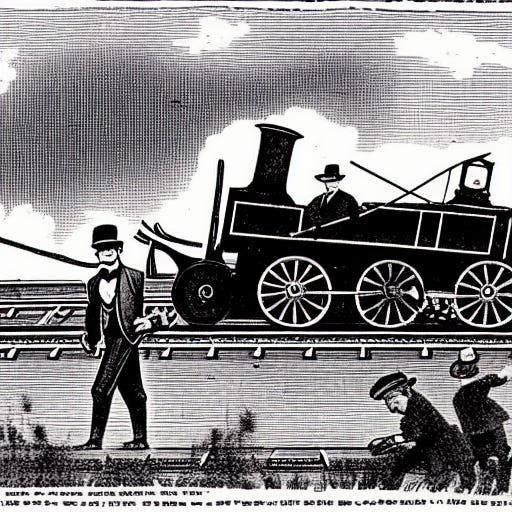The Railway Strike Is VERY Inflationary
And then the Fed will raise rates further and stocks will tank more
[My take at some generative art… ]
Yesterday was a bad day... Very bad day for the markets. With the S&P 500 falling over 4%, it was the biggest one day drop in over two years. The culprit is exactly what we think it would be: Inflation.
The CPI print came in at 8.3% yesterday…. But that wasn’t the worst part. Core CPI, which excludes energy and food prices was 0.6 percentage points higher than expectations. This tells inflation may not be as transitory as we’ve been led to believe.
Investors on Wall Street are watching the inflation numbers. The theory is if inflation is high, The Fed will continue raising rates. And higher rates are bad for stocks... The prevailing theory states high rates will slow economic growth.
Maybe it will. Maybe it won't. But higher rates certainly won't do one thing: kill inflation.
Someday I might make a more coherent argument about why that is... But for now let's just look at food.
My eggs from Walmart went from 89 cents last year to $3.99 - more than quadrupled. That's crazy. Will higher interest rates lead to more chickens that lay more eggs? Will it cause the end of the bird flu? Will higher interest rates create more farmers?
Of course the answer to those questions are "no."
Higher prices in food, fertilizer, health care, housing stem from supply chain issues. And these are issues the Fed can't fix.
But the markets are paying attention to the Fed, so we must as well.
I bring up this tangent because it leads to the crux of the article...
Supply Chain Disruptions are About to Get Worse
Many people don't realize how important our railway system is. Accord to a recent report from the association of American Railroads (AAR), the U.S. economy would lose $2 billion every day trains don't operate.
And remember that car shortage we have? Well 75% of finished vehicles get delivered to dealerships on trains. Might be a good time to buy a car.
Half of all U.S. fertilizers travel on trains. If those fertilizers don't get where they're supposed to it could lead to lower yields and higher food prices next year.
And one-third of U.S. grain exports travel by rail. I'm surprised this isn't more. But with our current stance of supporting a war in Ukraine, the U.S. needs to export grain to countries that used to buy grain from Ukraine.
We have no alternative to trains in this country. The AAR said we'd need 467,000 more long-haul trucks operating every day to make up this shortfall. Trucking companies already can't find enough drivers.
The head of the unions representing the 90,000 rail employees know they've got their bosses by the balls. This is why they're acting now.
And they're doing this right before the mid-term elections. President Biden claims to be a union friendly guy. But ironically, even he implored these workers not to strike. He knows it would be disaster leading to the mid-terms.
I'm betting all parties will come to terms. The railroad companies may even get some government support. We'll see.
But a railroad strike is a definite black swan type of event. One that will have ripple effects throughout the economy.
Inflation Will Soar if this Strike Happens
As we talked about above, the main inflationary culprits are: food, healthcare, and housing. And these are all supply driven.
Even the new car shortage was due to disruptions in semiconductor supply lines.
I forgot to mention that 11% of the nation's oil gets transported by rail as well.
We will see shortages like we haven't seen yet. And if you want to buy anything that gets transported by train, you'll be a paying a lot more... If you can even get it at all.
And don't think we'll be able to get packages delivered. UPS, FedEx, even Amazon use trains to move a significant percentage of their deliveries.
So we'll have an economy that can't deliver anything... A shrinking economy. And prices will go up. That's the definition of stagflation - the economic boogieman.
Stocks AND Bonds Will Tank
Investors will have no place to hide. Company profits will get hammered. That will likely lead to lower stock prices.
Bonds will also lose value because their coupon payments won't be as valuable to investors as they were before.... And bonds will lose value in real terms.
And because the Fed is almost singularly focused on inflation, rates will continue raising.
I don't think the market is fully pricing in this disruption yet.
Like I said, we don't know if it will happen or not. But we should prepare for this eventuality. This goes hand in hand with our prediction of lower market prices because the Fed keeps jacking up interest rates.
So what should we do? Sell any position we aren't in for the long run.
And for more aggressive traders, it's worth speculating on some puts. Since puts go up in value when the underlying security goes down, they protect our portfolio. Or can even expand the value our portfolio if we have enough.
This is the perfect play to take advantage of the barbell approach. These puts have an asymmetric payoff... We can limit our risk to the amount we spend in premiums. But we can earn multiples of that if these events take down the market.
That's the kind of special situation we look for here at Barbell Alpha.
Be careful... It's trying times. The economic winter is coming.


